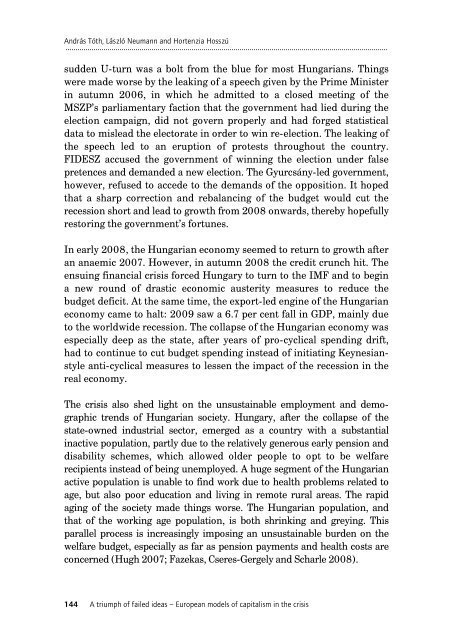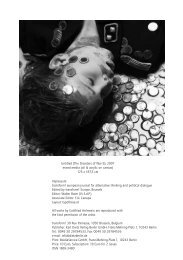A triumph of failed ideas European models of capitalism in ... - Journal
A triumph of failed ideas European models of capitalism in ... - Journal
A triumph of failed ideas European models of capitalism in ... - Journal
Create successful ePaper yourself
Turn your PDF publications into a flip-book with our unique Google optimized e-Paper software.
András Tóth, László Neumann and Hortenzia Hosszú.................................................................................................................................................................sudden U-turn was a bolt from the blue for most Hungarians. Th<strong>in</strong>gswere made worse by the leak<strong>in</strong>g <strong>of</strong> a speech given by the Prime M<strong>in</strong>ister<strong>in</strong> autumn 2006, <strong>in</strong> which he admitted to a closed meet<strong>in</strong>g <strong>of</strong> theMSZP’s parliamentary faction that the government had lied dur<strong>in</strong>g theelection campaign, did not govern properly and had forged statisticaldata to mislead the electorate <strong>in</strong> order to w<strong>in</strong> re-election. The leak<strong>in</strong>g <strong>of</strong>the speech led to an eruption <strong>of</strong> protests throughout the country.FIDESZ accused the government <strong>of</strong> w<strong>in</strong>n<strong>in</strong>g the election under falsepretences and demanded a new election. The Gyurcsány-led government,however, refused to accede to the demands <strong>of</strong> the opposition. It hopedthat a sharp correction and rebalanc<strong>in</strong>g <strong>of</strong> the budget would cut therecession short and lead to growth from 2008 onwards, thereby hopefullyrestor<strong>in</strong>g the government’s fortunes.In early 2008, the Hungarian economy seemed to return to growth afteran anaemic 2007. However, <strong>in</strong> autumn 2008 the credit crunch hit. Theensu<strong>in</strong>g f<strong>in</strong>ancial crisis forced Hungary to turn to the IMF and to beg<strong>in</strong>a new round <strong>of</strong> drastic economic austerity measures to reduce thebudget deficit. At the same time, the export-led eng<strong>in</strong>e <strong>of</strong> the Hungarianeconomy came to halt: 2009 saw a 6.7 per cent fall <strong>in</strong> GDP, ma<strong>in</strong>ly dueto the worldwide recession. The collapse <strong>of</strong> the Hungarian economy wasespecially deep as the state, after years <strong>of</strong> pro-cyclical spend<strong>in</strong>g drift,had to cont<strong>in</strong>ue to cut budget spend<strong>in</strong>g <strong>in</strong>stead <strong>of</strong> <strong>in</strong>itiat<strong>in</strong>g Keynesianstyleanti-cyclical measures to lessen the impact <strong>of</strong> the recession <strong>in</strong> thereal economy.The crisis also shed light on the unsusta<strong>in</strong>able employment and demographictrends <strong>of</strong> Hungarian society. Hungary, after the collapse <strong>of</strong> thestate-owned <strong>in</strong>dustrial sector, emerged as a country with a substantial<strong>in</strong>active population, partly due to the relatively generous early pension anddisability schemes, which allowed older people to opt to be welfarerecipients <strong>in</strong>stead <strong>of</strong> be<strong>in</strong>g unemployed. A huge segment <strong>of</strong> the Hungarianactive population is unable to f<strong>in</strong>d work due to health problems related toage, but also poor education and liv<strong>in</strong>g <strong>in</strong> remote rural areas. The rapidag<strong>in</strong>g <strong>of</strong> the society made th<strong>in</strong>gs worse. The Hungarian population, andthat <strong>of</strong> the work<strong>in</strong>g age population, is both shr<strong>in</strong>k<strong>in</strong>g and grey<strong>in</strong>g. Thisparallel process is <strong>in</strong>creas<strong>in</strong>gly impos<strong>in</strong>g an unsusta<strong>in</strong>able burden on thewelfare budget, especially as far as pension payments and health costs areconcerned (Hugh 2007; Fazekas, Cseres-Gergely and Scharle 2008).144 A <strong>triumph</strong> <strong>of</strong> <strong>failed</strong> <strong>ideas</strong> – <strong>European</strong> <strong>models</strong> <strong>of</strong> <strong>capitalism</strong> <strong>in</strong> the crisis








